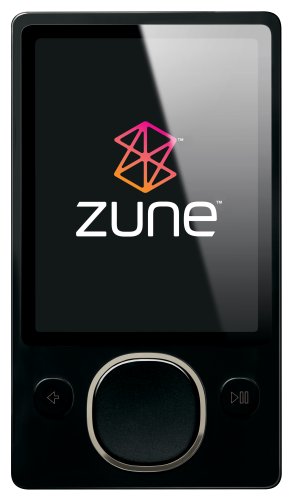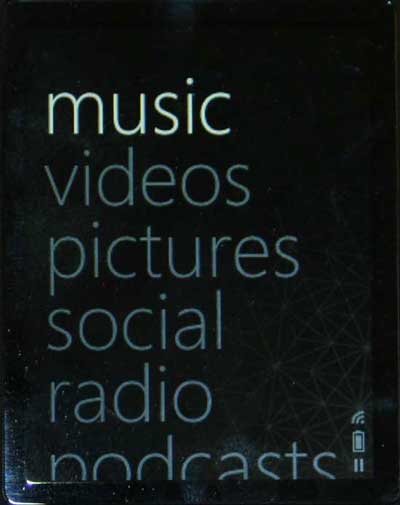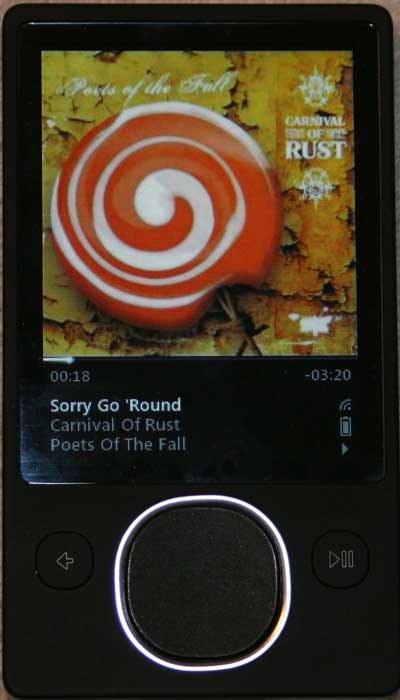iPod vs. Zune: January 2008 High End MP3 Player Roundup
by Ryan Smith on January 21, 2008 12:00 AM EST- Posted in
- Smartphones
- Mobile
Zune 80
Last but certainly not least we have Microsoft's second-generation Zune, the Zune 80. If the iPod Classic is the old guard and the iPod Touch the new guard, then the Zune is the missing link, as its feature set includes items from both generations of products, with interesting results.

As the successor to the original Zune (30) which was developed prior to the Touch, the Zune 80 is best described as an attempt to build a bigger, better iPod Classic; AKA the proverbial iPod killer. The original Zune launched with fairly tepid reviews thanks to a combination of poor design choices with both the hardware and the software. Since then Microsoft has gone back to the drawing board and heavily revised the Zune's hardware for the Zune 80, and taken out many of the kinks in the Zune software, which has also been pushed out to the original Zune as an update. The result is that their second generation Zune is immediately a much stronger contender than the original Zune was.
At $249 for the Zune 80, the Zune 80 is clearly targeted against the 80GB iPod Classic which retails at the same price and features the same 80GB 1.8" hard drive. Microsoft seems content to leave Apple alone at the $349 price point for the 160GB iPod Classic.
One of the biggest complaints with the original Zune was the controls, and that's where we'll start. The original Zune used a d-pad in the shape of a circle along with buttons on the left and right sides, something that would seem to be more at home on a Windows Mobile PDA than a MP3 player. The d-pad's successor in the Zune 80 is a touch-sensitive pad (the Zune Pad) in the shape of a squircle. Notably, the Zune Pad is only a single button, emulating the previous Zune's d-pad by reading the location of the thumb when the Zune Pad is pressed.
On the whole the Zune Pad is a mixed bag. The lack of touch controls on the original Zune were a massive mistake and this makes up for it greatly, as it's now far easier to quickly navigate through lists thanks to the ability to flick your finger along the Zune Pad to launch the list up or down. The biggest shortcoming in its design however is the Zune Pad just isn't very accurate. Because the Zune Pad uses touch loaction to figure out what d-pad action it should be emulating (or if it should be emulating a centered button press), we continue to have periodic issues accidentally scrolling up/down as we press the button because the Zune Pad reads our thumb actions as a flick while we're pressing the button. Through a month's practice we've learned how to better work with the Zune Pad to try to avoid such accidents, but we haven't been able to stop them completely. This particularly manifests itself during blind navigation, making that task harder than it should be.
Less significant is the fact that Zune Pad is hard to get a read on in terms of sensitivity; every now and then the Zune Pad is reading small motions as bigger than they are meant to be. Much of this has to do with the fact that the Zune Pad is fairly small (1" diameter) and requires repeated motions to use, so the device has brief 1" motions to decide what's going on. In all fairness to Microsoft, this is a case where they're between a rock and a hard place with what Apple has done. The iPod scroll wheel is simply a fantastic design, it's very comfortable and easy to use, with no significant problems in our opinion and none of the issues we've had with the Zune Pad. But we believe Microsoft can't outright copy the scroll wheel both because Apple's legal team probably won't let the idea go without a fight and because there's a certain level of harm that would come to Microsoft's reputation if it was such an obvious copy.
So what we get is the Zune Pad, to the detriment of the Zune 80. Don't get us wrong, it's not terrible (if you want terrible ask us about a Rio, any of them), it's just not great either; it's better than the first Zune and still not as good as the competition. Ultimately it's not possible to avoid fighting with the Zune Pad at least once, which is a tough sell in the iPod age. We should note that you can turn the touch-sensitive features of the Zune Pad off, which would solve some of our problems, but then we'd just be back to a d-pad.
Moving on, we come to the UI of the Zune. In all honesty we don't have much to say about the UI because we're largely content with it. Its anti-iPod design is rather obvious at times, starting with the white-on-black design compared to the iPod's black-on-white design, but at the end of the day it accomplishes the same things and works out rather well. Hierarchies are very solid designs for a MP3 player interface, and this is what Microsoft sticks to. If you've used any other MP3 player then you're not going to immediately know where everything is, but once you've used one hierarchical design you've basically used them all and will quickly adapt to the Zune.

The only thing keeping us from calling the Zune UI a draw with the iPod Classic's (it's basically incomparable to the Touch) are two nagging issues with it that we're having. First is a matter of design, Microsoft decided to shorten the hierarchy some by making song groupings a horizontal list across the top with the elements appearing below, skipping the need to actually traverse deeper. In practice this saves a short amount of time traversing the UI, but it also has the side effect of not making all of the groupings visible at once. What are the grouping methods and how many clicks/flicks do we need to make to get to the one we want? Because they're not all on the screen at once, you can't tell without going through them all. It's only a problem for new users, but it's a problem none the less.

The other issue we have is with the responsiveness of the UI. Most of the time it's fast, but not always; certain actions such as traversing through the song grouping methods too quickly will result in a UI that feels sluggish - never slow but sluggish. It's not enough to significantly impact the usability of the Zune, but it is enough to be annoying. Who ever heard of a MP3 player being sluggish? It just shouldn't be happening.










50 Comments
View All Comments
TedKord - Tuesday, January 22, 2008 - link
A mac IS a PC these days, only with fewer hardware choices and OSX instead of Windows/Linux, etc...Dennis Travis - Monday, January 21, 2008 - link
Interesting. I really like the Zune but use Macs for my everyday computing. Go figure! I do have Windows machines also but it would be nice if MS made the Zune work with OSX. I know many with Macs who like the Zune.madoka - Monday, January 21, 2008 - link
I know I'm not alone in this and as wrong as it maybe, everytime I see someone with a Zune, I think that that person could either not afford or was too cheap to pay for an ipod.marybear423 - Tuesday, January 22, 2008 - link
Riight...zune 80gb $249.99
ipod 80gb $249.00
Looks like all those "poor people" had to go cheap and shell out an extra $0.99 for their zune...
Brilliant. A+ for you.
kmmatney - Monday, January 21, 2008 - link
I want to commend you on nailing a huge issue in your introduction - gift cards. I was thnking about getting one of the lasser known MP3 brands - but I had to by my plasyer with BestBuy gift cards, so that ruled out a lot of my choices. I ended up going with the 8G Ipod Nano, since I liked that out of my choices at BestBuy. When your stuck with BestBuy, to really only have a few choices for a high end MP3 player.rhangman - Monday, January 21, 2008 - link
The only reason I bought an iPod was because at the time they were the only players that could be controlled by car head units. Just did a quick search and I couldn't really see anything for Zune's. Since I bought my head unit (Alpine) the number of iPod compatible decks (after market and stock) has increased significantly too.rcbm1970 - Monday, January 21, 2008 - link
Almost every review I have read that compares the zune 80 to the Ipod classic points out one very import feature: the superior sound quality if the zune. It isn't the earbuds its the sound quality of the base components. I took my the earbuds that came with my zune 80 and listened to many of the competition, and there is no comparison; the zune 80 is superior. As with the Iphone and its horrible call quality, the marketing of the cult and its design ignores the purpose of the device. This should be about sound quality being the primary concern. The fact that you were craving for an equalizers shows how little you understand about the sound quality issue. Did you understand that you are to fully place the zune earbuds into your ear to get the proper bass sound? I also question if you gave yourself enough time to get used to the zunes control features. It was into the third week before I started to get used to the short cuts. I will stick with cnet and pcmag if you produce reviews such as this.rcbm1970 - Monday, January 21, 2008 - link
I should clarify. By competition, I mean apple products. The creative products produce great sound. I haven't been able to compare to iriver devices, but the cnet folks have. This is really simple when shopping for these devices do look at the reviews, but then take your favorite set of headphones or buds (apple buds the exception) and listen to each device in the store. You will find the listening difference between the apple products and many of the others is analogous to dragging your hand across raw cardboard compared to fine finished wood. We have become so used to bad quality that we don't realize how good it can be.darkswordsman17 - Monday, January 21, 2008 - link
People,d the reason you shouldn't include stuff like the Zen and the Karma is that they are discontinued (in the case of the Karmas for a few years now). The Zen Vision: M is the closes to a direct competitor that Creative made to these two, and it is discontinued. We can throw the Cowon X5 in there as well. The new Zen I don't find comparable because it is flash based. It would be nice to see a flash comparison (where the Zune and iPods would get handed to it in price/performance and features, although the Touch would do well but it costs put it out of most people's consideration). There is a reason why there isn't any company making a music focused HDD based player, trying to compete with Microsoft and Apple is asking to lose money, and neither of those two are really competitive in the flash based players (at least on features and price), which allows them to actually compete. Of course that doesn't stop the iPods and Zunes from outselling them still.As for the slowdown on the Classic, have you tried using one with the updated firmware? The launch units did have some very bad slowdown, but it has since been resolved and is now much speedier.
On the sound quality side, I was a bit unimpressed, as hooking them up to machines to check their sound quality doesn't tell the whole story. I have not seen a single person who has heard both the Classic or recent iPods (which many say sound better than the Classic although some say the Classic is better as well) and the Zunes who did not say the Zunes sound much better to their ears. The Zune 80 especially is known to have an execptionally clean headphone out (most people don't recognize noise in the signal when they hear it, mostly because they aren't used to using higher quality audio components, and no I'm not talking $50,000 speakers here either).
Thats not to say the author's findings aren't valid, they just don't tell the whole story. I suggest checking out one of the many DAP/PMP review sites (such as DAPReview, AnythingbutiPod) and also forums such as the portable audio one on Head-Fi if you want more user consensus and in depth testing.
Bottom line, if you need the storage and don't want to spend to get into the PMP category, then the iPod Classic or Zune are both quite good, each with its own strenghts. For flash players, the new Zen is very nice but has issues with the SD expansion slot (it doesn't integrate its music and other files with that of those on the players internal memory). The Cowon D2 is very good, although I'd wait because I think they're probably going to up capacity on them fairly soon. In that same vein the iRiver Clix 2 is pretty nice as is the Meizu M6 I think its called. The Sandisk Sansas are ok, but they are targeted more at packing features in than actually being that good at anything (sound quality, interface, etc). Lastly, there is the new Sony players, which although they lack the expansion slots that have become defacto, they have gotten rid of needing software for use and all the DRM crap that hurt Sony so badly. Also they compete well with the iPod and Zunes in price and features, all the while having some of if not the best sound from a portable music player. Personally, I wouldn't even consider the flash based iPods or Zunes at all as they're high on price and low on features compared to the competition. Couple that with Amazon being a better place to get music online than either iTunes or the Zune marketplace (no DRM at all, not just on some music, competitive price with better quality) and there's no reason to tie yourself to a setup like that (Amazon has a utility that will sync your downloads from them with iTunes so thats a non-issue).
Odeen - Monday, January 21, 2008 - link
Any "high-end" MP3 player comparisons should also include the Rio Karma for a few reasons:The Karma is the de-facto standard in sound quality for MP3 files, and includes a dock that allows one to output line-level audio, bypassing the internal amplifier
The Karma includes a 5-band parametric equalizer. Not only can you individually adjust any of the five bands, but you can also change the scope of the adjustment, as the "width" of the band is customizable
The Karma is the only player that supports proper gapless playback with regular MP3 files. I don't know about you, but pauses and clicks where the music should be seamless is a huge reduction in sound quality.
The Karma is the only player that supports free codecs of both lossy and lossless variety. If MP3 suddenly goes the way of the GIF (i.e. the format creator starts pursuing royalties more aggressively) and your mp3's are outlawed, the Karma will still play OGG and FLAC files, formats that cannot be patented or restricted.
Basically, if you are comparing "MP3 Players", first and foremost judge them on how well they PLAY MP3's. I consider that any player wishing for itself to be considered "high end" should produce good sound quality without skipping or popping between tracks - which neither the iPod or Zune can. Everything else is pretty much gravy - whether it's a user interface that's not steeped in heavy geek, whether it's tight integration with a media management suite or music store, whether it's the ability to play videos or squirt. A high-end MP3 player should play MP3's better than anything else, and that's not what the iPod or the Zune offer.